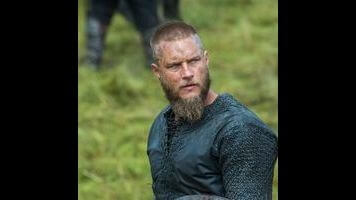Vikings: “Mercenary”

For all its considerable virtues, Vikings’ main strength has been its ability to convey otherness. Period dramas all aspire to that, but most often the inability to populate their worlds with characters whose sensibilities convincingly appear to spring from a time and place alien to ours means they play out like soaps in fancy dress. At its best, Vikings has succeeded in portraying a world whose ideas and values are coming from a culture both fully realized and uniquely its own. In its best episodes (season one’s “Sacrifice” comes to mind), there’s a mesmeric power in watching these characters make choices whose logic makes complete sense even as they are coming from places which do not.
Conversely, the show has been at its weakest when its characters have been given to explain themselves. Travis Fimmel’s Ragnar Lothbrok has presence in direct proportion to how enigmatic his actions appear, a fact that holds true with the show as a whole. The Vikings of Vikings have a baseline of recognizable human virtues—they love and hate, possess loyalties and jealousies—but they have more integrity as characters the more couched those drives are in less recognizable motives. That’s a difficult balance to maintain, and “Mercenary,” the season three premiere, can’t find it, establishing the new season’s plotlines with a lot of distressingly dull dialogue and overly familiar conflicts.
After defeating the treacherous King Horik in last season’s finale, Ragnar is now king, preparing to sail back to England to take up King Ecbert’s offer of farmland in exchange for the Norsemen not slaughtering his soldiers quite so often. Meanwhile, Lagertha’s reign as Earl Ingstad is strong, as she plans to join the journey to Wessex with Ragnar and confides in new advisor Kalf (Ben Robson), who warns her of a coming insurrection from the kin of her deceased, worthless former husband. Ragnar’s strapping son Bjorn has knocked up his wife, the former slave girl Porunn, but can’t prevent her (now a shieldmaiden) from accompanying him on the voyage to Wessex. Floki and Rollo (and the drunken and fertile Torstein) are itching to go as well, at least partly in order to flee their various woman troubles. Over in Wessex, Linus Roache’s King Ecbert has plans for Ragnar and his people to take up for the deposed Princess Kewnthrith (Amy Bailey) in her quest to regain the throne of neighboring Mercia, while Ecbert’s supercilious son Aethelwulf (Moe Dunford) joins the attack on Mercia. Oh, and Aethelwulf’s wife is drawn to former monk Athelstan, which appears to be setting up a love triangle of some sort.
That’s a lot of plot, which isn’t unnatural for a season premiere, but another Vikings virtue has been a gratifying storytelling briskness, something not in evidence here. The manner in which the show would let its storytelling filter through seemingly isolated episodes without needing to spell out each intervening plot point has been one of its most refreshing devices. As a viewer, the way that Vikings trusts me to catch up is often challenging, and adds to the propulsive drive present in much of the show. Here, all of the elements are introduced in a much more straightforward manner, which might be less of a red flag if the dialogue weren’t so often perfunctory.
Ragnar comes through best, with Fimmel continuing to layer his performance with sly smiles that suggest the unspoken thoughts underneath. (Even as king, Ragnar, in Ecbert’s camp and sailing to battle with Kwenthrith, has the same physicality, slouching watchfully, his pale eyes sparking with knowing mischief.) But, in his conversation with Alyssa Sutherland’s Auslag about their crippled son Ivar, there’s the creep of the prosaic.
“Do you care?”
“Yes I care.”
“Do you love him?”
“Of course I love him.”
 Keep scrolling for more great stories.
Keep scrolling for more great stories.
